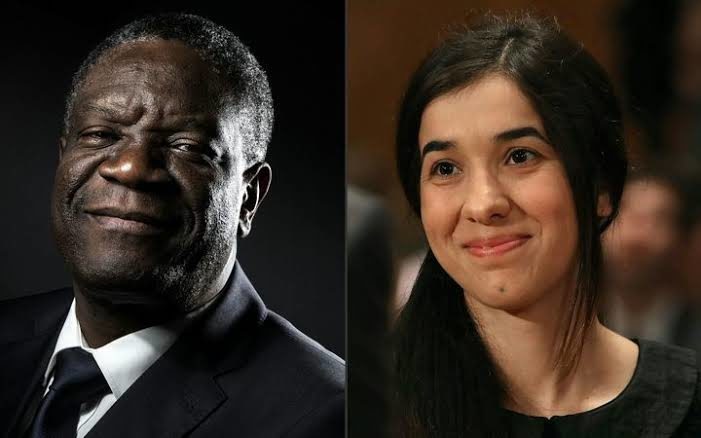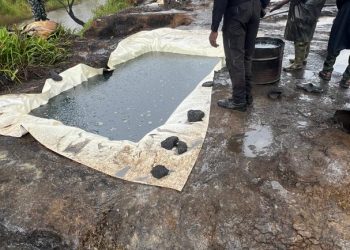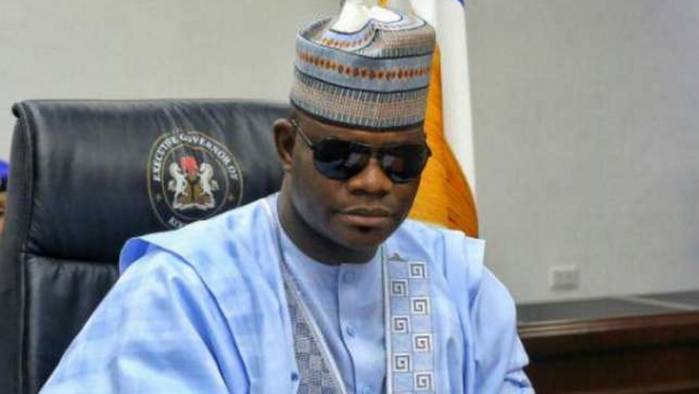The 2018 Nobel Peace Prize has gone to campaigners against rape in warfare, Nadia Murad and Denis Mukwege.
Ms. Murad is an Iraqi Yazidi who was tortured and raped by Islamic State militants and later became the face of a campaign to free the Yazidi.
Dr Mukwege is a Congolese gynaecologist who, along with his colleagues, has treated tens of thousands of rape victims.
Some 331 individuals and organisations, including Nigeria’s Dr. Oby Ezekwesili were nominated for the prestigious peace award this year.
The winners announced in the Norwegian capital Oslo on Friday won the award for their “efforts to end the use of sexual violence as a weapon of war”, Berit Reiss-Andersen, the Nobel committee chair, said.
The pair both made a “crucial contribution to focusing attention on, and combating, such war crimes”, Ms. Reiss-Andersen added.
Ms. Murad, 25, said in a statement that many Yazidis would “look upon this prize and think of family members that were lost, are still unaccounted for, and of the 1,300 women and children, which remain in captivity.”
“For myself, I think of my mother, who was murdered by DAESH [IS], the children with whom I grew up, and what we must do to honour them,” she added.
“Persecution of minorities must end. We must work together with determination – to prove that genocidal campaigns will not only fail, but lead to accountability for the perpetrators and justice for the survivors.”
Ms. Murad did not just lose her mother in the genocide. She endured three months as a sex slave at the hands of IS militants. She was bought and sold several times and subjected to sexual and physical abuse during her captivity.
New Iraqi President Barham Saleh called the award “an honour for all Iraqis who fought terrorism and bigotry.”
Dr Mukwege was operating at his hospital when he heard he had won the prize.
“I was in the operating room so when they started to make noise around [it] I wasn’t really thinking about what was going on, and suddenly some people came in and told me the news,” he told Norwegian newspaper VG.
He dedicated his award to all women affected by sexual violence.
“This Nobel prize is a recognition of the suffering and the failure to adequately compensate women who are victims of rape and sexual violence in all countries around the world,” he told reporters gathered outside his clinic.
He has spent decades helping rape victims in the Democratic Republic of Congo.
He and his colleagues are said to have treated about 30,000 rape victims, developing great expertise in the treatment of serious injuries sustained during sex assaults that were carried out as a weapon of war.
READ ALSO: Flood disaster: WHO steps up disease prevention efforts in Nigeria
Romania marriage poll: One man, one woman definition up for vote
Romanians are deciding this weekend whether a family should revolve around a married man and woman.
The two-day vote on changing their constitution has been portrayed by supporters of the referendum as a way of protecting the status of the “traditional” family.
Opponents warn it will come at the expense of same-sex couples, single parents and children too.
And there are accusations that the whole exercise is a sideshow to distract from a corruption case involving the leader of the ruling party.
Romania does not recognise gay marriage or civil unions, and the referendum does not change that. Instead, it is about clarifying the language in the constitution.
Article 48 says the family “is founded on the freely consented marriage of the spouses.” A Yes vote would change that to “marriage between a man and a woman.”
“We want to protect, at a constitutional level, the definition of marriage – between one woman and one man,” says Mihai Gheorghiu, president of the pro-referendum Coalition for Family.
That definition is already enshrined in the civil code, but his group wants “another level of protection” in the constitution.
Mr. Gheorghiu – a former government minister – is adamant that same-sex couples would not lose out.
“In respect of LGBT rights and needs, there will be no change,” he says. Homosexuality in Romania was decriminalised in 2001.











